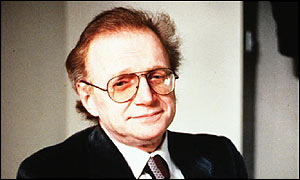June 13, 2004
STAND UP, NIGEL BARTON

I remember, I remember
The school where I was born;
I remember, I remember,
The school where I was ..... torn.
Nietzsche:
'And nowadays what else does education and culture want! In our age of the people—I mean our uncouth age—“education” and “culture” must basically be the art of deception, to mislead about the origin of the inherited rabble in one’s body and soul.'
Dennis Potter's Stand Up, Nigel Barton, shown as part of BBC 4's Summer of the Sixties season, is still almost too painful to watch.
Here is Potter writing a television play which draws very closely upon his experiences as a scholarship boy, projected out of his class into the rarefied world of Oxford. 'Stand Up, Nigel Barton' was actually written after 'Vote, Vote, Vote for Nigel Barton', Potter's fictionalized account of his failed attempt to become elected as a Labour MP. To Potter's disgust, 'Vote, Vote, Vote' was suppressed by the BBC, but its temporary banning allowed him to work again with the characters he had invented, writing this prequel which would be shown first.
English fiction has always been ambivalent about social mobility. Potter's theme was very much one with which the sixties would be preoccupied, in music as much as drama. Condider the Kinks ('Rosy, won't you please come home', 'See my friends/ they cross the river') or the Who ('I was born with a plastic spoon in my mouth'). Like Dickens' Pip, Nigel is profoundly torn; unwilling to give up the privilege and status he has newly acquired, unable to accept and enjoy them as one to the manner born, simultaneously holding onto his roots and repudiating them, never forgetting where he has come from, but ashamed of the stains that his origins have left upon him. And ashamed of that shame. Never comfortable amongst the masters, but no longer at home in the community which produced him.
Forty years on, and the screen still crackles with rage, confusion and embarrassment. Potter intercuts between the working men's club, bedrock of the proletarian community, with its 'suffocating affection' but deep suspicion, resentment and distrust of those who leave; and the smug redoubt of the Oxford Union, whose louche members idly trade bon mots ('Oxford,' as Nigel observes in his somewhat too histrionic style, 'where nothing really matters', where a dissolute, ironic detachment is the mark of a gentleman, and where Nigel's very passion marks him out as not quite right.)
Who can watch the final scene - Nigel at home with his parents, watching himself being interviewed on television about class - without cringing? What Nigel says about his father 'watching him like a hawk', about 'walking a tightrope', about class only being experienced by those who move between classes; none of this is a distortion. And yet, Nigel is too much in love with his own cleverness, too much attached to the role of alienated working class boy that he has been invited to play. He knows he has betrayed his parents. His father, ambivalent about him at the best of times, both proud and resentful, simmers; his mother, uncomprehending, weeps 'But it's clean. You could eat off the floor here...'
Potter shows that he can do naturalism painfully and powerfully. But he's already exploring more expressionistic techniques: playing with chronology, breaking the frame (adults playing children, characters speaking directly to camera). The origin of the famous classroom scene in The Singing Detective is here, with Janet Henfrey taking on the role of the terrifyingly inquisitorial, witch-like schoolmistress she will reprise in the later play. The performances, especially Keith Barron as Nigel and Jack Woolgar as his father, are universally superb.
No need to reiterate, by now, my lament for TV drama this challenging, this near-the-knuckle, this relevant. But what a nihilistic message Potter conveys. There is nothing to aspire to, nothing you'd want to return to. Nigel trapped and alone, forever alone...
"With Stand Up, Nigel Barton I knew that in small family groupings - that is, at their most vulnerable - both coalminers and Oxford dons would probably see the play. This could add enormously to the potency of a story which attempted to use the specially English embarrassment about class in a deliberately embarrassing series of confrontations. In the theatre - or, at least, in the West End - the audience would have been largely only on one side of this particular fence. There is no other medium which could virtually guarantee an audience of millions with a full quota of manual workers and stockbrokers for a 'serious' play about class."
Posted by mark at June 13, 2004 12:51 AM | TrackBack